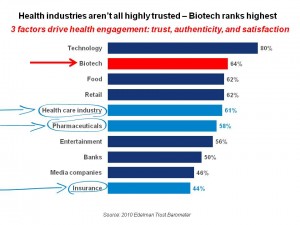Without trust, health consumers won’t engage with organizations who want to cure them, sell to them, promote to them, help them. Here’s what I told a group of pharmaceutical marketers at The DTC Annual Conference in Washington , DC, on April 9, 2010.
Let’s start with the World Health Organization’s definition of health: that is, the state of complete physical, mental and social wellbeing, and not just the absence of disease.
This definition is being embraced by health citizens long before the silos in the health industry – including pharma – get it.
That’s an important mindset to take on as you think about consumers’ views on engaging in health, 24×7. Within that vision, let me briefly touch on 3 interrelated environmental issues that are morphing health citizens into health consumers for the next few years.
First, consider the risk-management world in which you’re operating. We’re living post-Vioxx where health citizens confront a growing list of FDA recalls and warnings. This has eroded consumer confidence in the pharmaceutical industry. And, of course, underscoring this point are uncertainties about the roles of a re-imagined FDA.
A second consumer-facing environmental theme is the search for value in health care among those who pay for it. Corporate and government payers for health are managing their risk by redesigning plans that put more financial burden for health costs on employees and enrollees. That’s reshaping health citizens into health consumers, as they/we bear greater copayments and premium sharing for health insurance and health services. What we know about health consumers in this recession from data gleaned in a survey by the Kaiser Family Foundation in their health tracking poll of September 2009 is that 56% of Americans did something to change their consumption of health services in the past year as a result of cost: these ‘somethings’ included splitting pills, not filling prescriptions, not refilling prescriptions, postponing visits to doctors, avoiding recommended medical tests, and other bad health behaviors. At the point of purchase when a health consumer has sticker shock for a prescription drug at the point of purchase, this doesn’t create a loving, trust-building health moment.
Finally, think about the Walmart impact on the market. When , this disrupted your market and continued to fan the demand for generics. IMS Health reported last week that the generic fill rate exceeded 75% in 2009. Payers, both consumers and sponsors of health plans, find value in generic drugs. And so the branded prescription drug has been largely commoditized. With a vigilant eye on value in health purchasing, people are reading Consumer Reports Best Buy Drugs and joining the ranks of PatientsLikeMe and other social networks to learn what drugs are working in “people like me” with my conditions.
Consumers go to these sources of information looking for trusted content and support. In the first Edelman Health Engagement Barometer, consumers said the three top factors that drove their health engagement with a particular organization were trust, authenticity, and satisfaction. We are now in a state of consumer dissatisfaction with the pharmaceutical industry – consider this a crisis in confidence. At the core of this crisis is a lack of trust.
The Edelman Trust Barometer found that health industries don’t rank the highest for consumers’ trust compared to other sectors, as shown in the chart above. When we break out different health industry segments, biotech ranks the highest just under technology, with the “health industry” writ large and pharmaceuticals falling below technology, food and retail, and just north of entertainment.
Without trust, there isn’t a solid platform for consumers to engage in health with you.
Health Populi’s Hot Points: Trust is the new currency for health engagement. Health reform or not, health citizens won’t become true health consumers without adopting tools and understanding information about their health plans, products, services, and instructions given to them by their physicians — who, by the way, continue to be the most trusted touchpoint in the health system. Physicians, along with the Internet, are the two go-to sources for health information. As stakeholders int he health industry move their messages toward Internet channels, the messages won’t resonate unless they’re trusted. Consider partnering with other trusted health players such as advocacy organizations and local provider health systems, along with more disruptive approaches like consumer technology and entertainment. Note, for example, the new program of Get Yourself Tested — GYT – a public health project sponsored by MTV and Kaiser Family Foundation’s It’s Your Sex Life effort. This edgy message is pitched just right: right channel, great design, well-said, trusted partner for the target population.
Note of transparency: Edelman is a client of THINK-Health.






 Grateful to Gregg Malkary for inviting me to join his podcast
Grateful to Gregg Malkary for inviting me to join his podcast  This conversation with Lynn Hanessian, chief strategist at Edelman, rings truer in today's context than on the day we recorded it. We're
This conversation with Lynn Hanessian, chief strategist at Edelman, rings truer in today's context than on the day we recorded it. We're